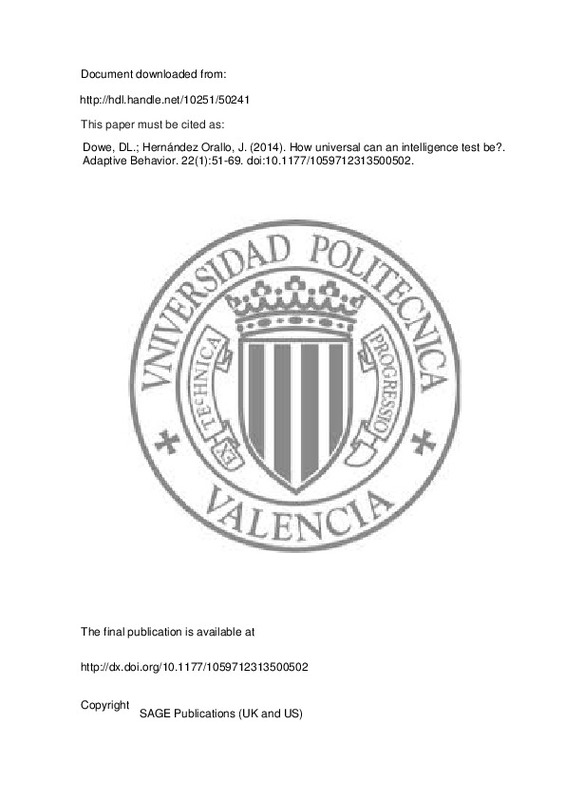JavaScript is disabled for your browser. Some features of this site may not work without it.
Buscar en RiuNet
Listar
Mi cuenta
Estadísticas
Ayuda RiuNet
Admin. UPV
How universal can an intelligence test be?
Mostrar el registro sencillo del ítem
Ficheros en el ítem
| dc.contributor.author | Dowe, David L.
|
es_ES |
| dc.contributor.author | Hernández Orallo, José
|
es_ES |
| dc.date.accessioned | 2015-05-14T11:16:28Z | |
| dc.date.available | 2015-05-14T11:16:28Z | |
| dc.date.issued | 2014-02 | |
| dc.identifier.issn | 1059-7123 | |
| dc.identifier.uri | http://hdl.handle.net/10251/50241 | |
| dc.description.abstract | [EN] The notion of a universal intelligence test has been recently advocated as a means to assess humans, non-human animals and machines in an integrated, uniform way. While the main motivation has been the development of machine intelligence tests, the mere concept of a universal test has many implications in the way human intelligence tests are understood, and their relation to other tests in comparative psychology and animal cognition. From this diversity of subjects in the natural and artificial kingdoms, the very possibility of constructing a universal test is still controversial. In this paper we rephrase the question of whether universal intelligence tests are possible or not into the question of how universal intelligence tests can be, in terms of subjects, interfaces and resolutions. We discuss the feasibility and difficulty of universal tests depending on several levels according to what is taken for granted: the communication milieu, the resolution, the reward system or the agent itself. We argue that such tests must be highly adaptive, i.e., that tasks, resolution, rewards and communication have to be adapted according to how the evaluated agent is reacting and performing. Even so, the most general expression of a universal test may not be feasible (and, at best, might only be theoretically semi-computable). Nonetheless, in general, we can analyse the universality in terms of some traits that lead to several levels of universality and set the quest for universal tests as a progressive rather than absolute goal. | es_ES |
| dc.description.sponsorship | This work was supported by the MEC/MINECO (projects CONSOLIDER-INGENIO CSD2007-00022 and TIN 2010-21062-C02-02), the GVA (project PROMETEO/2008/051) and the COST-European Cooperation in the field of Scientific and Technical Research (project IC0801 AT). | |
| dc.language | Inglés | es_ES |
| dc.publisher | SAGE Publications (UK and US) | es_ES |
| dc.relation.ispartof | Adaptive Behavior | es_ES |
| dc.rights | Reserva de todos los derechos | es_ES |
| dc.subject | Intelligence | es_ES |
| dc.subject | Universal tests | es_ES |
| dc.subject | Test interface | es_ES |
| dc.subject | Space-time resolution | es_ES |
| dc.subject | Machine evaluation | es_ES |
| dc.subject.classification | LENGUAJES Y SISTEMAS INFORMATICOS | es_ES |
| dc.title | How universal can an intelligence test be? | es_ES |
| dc.type | Artículo | es_ES |
| dc.identifier.doi | 10.1177/1059712313500502 | |
| dc.relation.projectID | info:eu-repo/grantAgreement/COST//IC0801/EU/Agreement Technologies/ | es_ES |
| dc.relation.projectID | info:eu-repo/grantAgreement/MEC//CSD2007-00022/ES/Agreement Technologies/ | es_ES |
| dc.relation.projectID | info:eu-repo/grantAgreement/GVA//PROMETEO08%2F2008%2F051/ES/Advances on Agreement Technologies for Computational Entities (atforce)/ | es_ES |
| dc.relation.projectID | info:eu-repo/grantAgreement/MICINN//TIN2010-21062-C02-02/ES/SWEETLOGICS-UPV/ | |
| dc.rights.accessRights | Abierto | es_ES |
| dc.contributor.affiliation | Universitat Politècnica de València. Departamento de Sistemas Informáticos y Computación - Departament de Sistemes Informàtics i Computació | es_ES |
| dc.description.bibliographicCitation | Dowe, DL.; Hernández Orallo, J. (2014). How universal can an intelligence test be?. Adaptive Behavior. 22(1):51-69. https://doi.org/10.1177/1059712313500502 | es_ES |
| dc.description.accrualMethod | S | es_ES |
| dc.relation.publisherversion | http://dx.doi.org/10.1177/1059712313500502 | es_ES |
| dc.description.upvformatpinicio | 51 | es_ES |
| dc.description.upvformatpfin | 69 | es_ES |
| dc.type.version | info:eu-repo/semantics/publishedVersion | es_ES |
| dc.description.volume | 22 | es_ES |
| dc.description.issue | 1 | es_ES |
| dc.relation.senia | 263132 | |
| dc.contributor.funder | Ministerio de Educación y Ciencia | |
| dc.contributor.funder | European Cooperation in Science and Technology | es_ES |
| dc.contributor.funder | European Commission | |
| dc.contributor.funder | Generalitat Valenciana | |
| dc.contributor.funder | Ministerio de Ciencia e Innovación | es_ES |







![[Cerrado]](/themes/UPV/images/candado.png)

